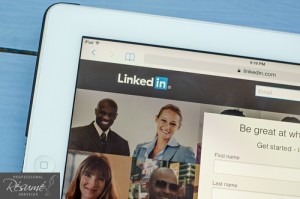You can have an extensive amount of experience with unique skill sets and seem like a perfect fit for a job, but employers will still be hesitant to hire you if you don’t have a solid online presence. In this day and age, leaders have to be visible to the public. Having social proof that you are who you say you are is one thing, and seeing how you would be viewed in the eyes of potential customers is another. So how can you ensure your c-level personal branding is up to par? Here’s the proper way to build your online personal brand and how to manage it for years to come.
Diversify Your Visibility
You may start by working with a LinkedIn profile writing service to develop your LinkedIn profile. This is a critical component of any good online image, but it won’t build your brand alone. You also have to diversify your visibility by being active on other sites like Twitter, Facebook, your own blog and maybe even commenting on blogs written by other professionals. Any LinkedIn profile writing service will say the more visible you are, the stronger your online brand will be. So creating unique, insightful and relevant content and posting it across multiple platforms can give you the diversity you need.
Clean Up Your Online Image
Employers want to know as much as they can about a candidate. Most of the time it means they are going to run a Google search for your name and see what comes up. Before this happens, you should run the same search yourself and clean up anything you don’t want other people to see. The goal is to have your LinkedIn executive profile show up at the top of the search results so there’s no questioning in your online presence.
Never Stop Enhancing Your Personal Brand
You should never stop building and managing your online c-level personal branding. A lot of the work is done upfront with building a solid reputation, but after that it’s important to continue posting new content and staying active. Do a Google search for your name frequently just to ensure everything is still clean. The thing with c-level personal branding is you can never stop working on it if you want to maintain a strong reputation.
Professional Resume Services has plenty of tips and tricks to help executives build and manage their personal brand online. Our LinkedIn profile writing service is designed to help you create a profile from scratch or even tweak and polish your existing profile. It takes time to build your personal brand, but it’s well worth the effort. Feel free to reach out to us at any time for assistance along the way.
 Whether you like your current boss or not, it’s important to understand they can have a major impact on your future career. In a perfect world, we would all have a boss we get along with very well and who understands when we want to advance our career. Unfortunately, that’s not usually the reality, and getting along with the boss is sometimes more difficult than you want it to be. In addition to writing resumes that get you hired, you have to know whether your boss is helping or hurting your future career opportunities. Here are a few aspects to consider in this regard.
Whether you like your current boss or not, it’s important to understand they can have a major impact on your future career. In a perfect world, we would all have a boss we get along with very well and who understands when we want to advance our career. Unfortunately, that’s not usually the reality, and getting along with the boss is sometimes more difficult than you want it to be. In addition to writing resumes that get you hired, you have to know whether your boss is helping or hurting your future career opportunities. Here are a few aspects to consider in this regard.
Not Giving You The Credit You Deserve
If your boss has a tendency to take credit for the work you’ve done, you may need to step in and take action. Of course, it’s not the best idea to confront them with a negative tone, but there’s usually no harm in having a positive conversation with them about it. Most of the time the rest of your organization will know the work you put into any given project and know you’re the one who should get the most credit. If your boss refuses to give you credit for any projects you do, then you may feel like you’re spinning your wheels with no opportunities for career advancement.
Picking Favorites in The Office
Every boss has their favorites. You would never put that you were your boss’s favorite person in your executive profile, but it definitely helps when it comes to advancing in your career. The best thing to do is go out of your way to get on your boss’s good side, in addition to delivering high quality work. Find out about some of their hobbies or interests and strike up conversations with them. Making this personal connection without overstepping boundaries will keep you at the forefront of their mind when other opportunities arise. Again, this information won’t go on your executive profile, but it’s human nature for your boss to like you more if they feel a connection with you other than working in the same building.
Constantly Providing You With Urgent Projects
Your boss may give you urgent projects from time-to-time, but if every single project is so urgent that you can’t get your own work done, it may be time to address it with them. The best resume writing service always suggests adding achievements and accomplishments on your resume, but an unreasonable boss can prevent this from happening. If you simply can’t get your work done because of these projects, let your boss know what’s on your plate and ask them to help you prioritize projects. You’ll feel less stressed as a result and your boss should be open to helping you out.
Professional Resume Services is known as the best resume writing service, but our services go beyond simply writing a resume. We are here to help you with any aspect of your career. Whether you’re searching for a job, looking to advance with your current employer or want to explore a new career, we have some great resources to help you. Never hesitate to reach out to us if you need any assistance with your present or future career.
One common mistake many executives have is allowing their network to go stagnant. It’s easy to do when you have a stable job, have no intentions of leaving your job and are constantly too busy to reach out to your connections. However, it’s important to keep a solid active network even when you’re not on a job search, just so your name and brand are still at the top of people’s minds.
The reality is people have to rebuild their executive network all the time. You could begin with enhancing your LinkedIn profile development, but most of the time it’s best to just jump right into rekindling relationships you’ve had in the past with other executives.
 Start By Rebuilding Relationships
Start By Rebuilding Relationships
Any time you try to rebuild a relationship because you fell out of touch, those other people likely know the reason. Even if you are getting back in touch because you’re looking for a job, it doesn’t mean you have to explicitly state your intentions. Ask them about how their life has been since you last spoke. Talk about family, activities and their career, but try not to make the conversation about you.
Acknowledge and Apologize for Losing Touch
Before you really get started rebuilding a relationship, acknowledge to them that you lost touch and apologize for it. Starting off with this approach will make the other person feel the same way and will likely apologize as well. Everyone is busy, so it’s tough to keep in touch at all times.
Don’t State Your Employment Position Unless Asked
If you reach out to a contact over LinkedIn, they will have likely looked at your executive profile to know your employment position. Even though you may be actively looking for a job, you don’t have to explicitly state it to your contact. The worst thing you can do when rebuilding your executive network is make the other person feel bad or guilty during a conversation.
Ask for Expert Advice Rather Than Job Recommendations
Your executive profile should state your job status, but you shouldn’t restate it to your contacts when rebuilding your executive network. If you feel like you need to tell them about your situation, then ask for their advice on finding a job, rather than explicitly asking for recommendations. People are much more willing to offer their own advice to you rather than going out of their way to help you find a job.
Professional Resume Services understands the importance of building and maintaining a solid executive network. With our professional resume writing service, you’ll be able to put together a solid resume to use for networking, applying for jobs or handing directly to a recruiter. If you need assistance or advice when rebuilding your executive network, don’t hesitate to reach out to us.

An executive LinkedIn profile can help you stand out.
When you are looking for employment, there are many tools at your disposal. Some of them are online, and a few of them are off. One of the most powerful online platforms for professionals is LinkedIn. This social platform is different from many other online networks because it caters to the professional. For anyone looking for a job in today’s competitive market, having an executive LinkedIn profile is a must. However, your executive profile on LinkedIn is meant to be much more than a place to post your resume. There are some distinct differences between the two.
Intended Audience
Your resume and your executive LinkedIn profile are written with totally different audiences in mind. Resumes are written with the intent of distributing them to hiring agents or recruiters. They are geared toward trying to obtain a specific position or take advantage of a specific opening or opportunity. Your LinkedIn profile development, on the other hand, is for the purpose of letting everyone in your industry become familiar with your professional work. Instead of being written for a single recruiter like a resume, your LinkedIn profile is written for anyone in your industry to read, from colleagues to supervisors to potential clients.
Search Engine Optimization
When you are writing a professional resume, you have to be succinct and remember space is limited. For most purposes, resumes need to be kept to a page or two max. When you are working on your LinkedIn profile development, there are character limits you should keep in mind. Because you don’t have an unlimited amount of space in your professional LinkedIn profile, you need to both stick to your highlights and try to incorporate as many keywords as possible. This will allow companies to pull you up in a search and see the most important details of your work history and skills.
Use Different Tones
A resume is straightforward when it comes to the tone. It is impersonal and you need to refrain from using “I.” However, in your LinkedIn executive profile, you can use first-person expressions. And you should! It’s important to share your personality and personal story with the audience. Your online profile lets others in your industry become acquainted with who you are as a person, not just a resume trying to get a specific position. Resumes are effective and have their purpose, but your LinkedIn profile needs to be more engaging and personal, while remaining professional.
In conclusion, your resume and LinkedIn profile are essential tools for making contacts within your industry. However, there are some distinct differences between the two. If all you do is post your resume on your LinkedIn profile, you will risk losing your audience altogether. Keeping in mind the intended audiences, tone and purpose will help you get the most out of both mediums and get your name out in the industry.

Your executive profile needs to pass the test.
According to a famous study, employers spend an average of six seconds scanning a resume before deciding whether the candidate is worth calling for an interview. To put it mildly, that’s not a lot of time. With that in mind, the clear takeaway is you need to get the employer’s attention and fast. The question is, how? Here are a few tips in executive resume writing that will get you that call.
First Things First
Your cover letter is your chance to showcase your particular talents and set yourself apart. Rest assured, they do get read! Using an executive resume cover letter is the best way to get noticed right out of the gate.
Be Professional
While your friends may call you ‘Buttercup,’ your resume should not. Likewise, your email address should not be goofy or too casual. Avoid using photos as well. This professionalism will set the tone for the rest of your resume. Location matters as well: your employer wants to be sure you’re in the same area as the job. If you need help, take a look at a few executive profiles for direction.
Keep It Tidy
Be sure the structure of your executive resume cover letter is clean and neat. The columns should be aligned, and any bullet points should line up as well. A sloppy resume will indicate you are not taking this job search seriously, and likewise, the employer will not give you the consideration you deserve.
Dates Matter
The hiring manager of a company you apply to is going to make sure your past employment dates line up. In other words, they want to make sure you don’t have large gaps between jobs. That’s a huge red flag to any employer, indicating you might not be reliable.
Be Thorough
While it’s understandable you want to keep your executive profile to the point, you need to give enough details. Thoroughly explain your past positions and what responsibilities you held while in those jobs. Also, be sure to include your past achievements.
Are You Applying for the Right Job?
It’s understandable you may be applying for a position you’re overqualified for. You may be desperate for any job at all or find pickings are slim all around. However, a hiring manager knows you won’t stick around long, and thus, your resume goes to the bottom of the pile.
Attention to Detail
While it may seem obvious, many people forget to proofread. Make sure you don’t have any grammar or spelling mistakes. Even though everyone makes these type of mistakes now and again, this is another immediate disqualifier in the six-second test.
Follow these tips and you’ll have executive resume writing down in no time, ensuring your executive profile and resume pass the six-second test.
 Your executive profile can play a major role in whether you get hired for a job. If you aren’t using the best resume writing services to help you in your job search, you may find your resume is constantly rejected. Instead of giving up on your job search, consider whether one of these reasons applies to your resume.
Your executive profile can play a major role in whether you get hired for a job. If you aren’t using the best resume writing services to help you in your job search, you may find your resume is constantly rejected. Instead of giving up on your job search, consider whether one of these reasons applies to your resume.
1. An Overwhelmed Hiring Manager
Even hiring managers can become overwhelmed with too much information and may overlook your resume, especially if they feel the content is irrelevant. This is why it’s important to determine the exact information that impacts your ability to do the job and stick to that information alone.
2. Missing That Certain Something
Cover letter writing services can help you determine if you’re missing something critical that could be preventing you from getting the job. While sometimes this missing factor may be beyond your control, there may be other factors you need to highlight or potentially leave off your resume and cover letter for the best results.
3. Relocation Issues
If you’re applying for a job that requires you to relocate, one of the biggest issues can be when you are able to make the move. In some situations, your timeline may not line up with the requirements of the job. Therefore, it’s important to make sure you are flexible with your moving plans to eliminate this issue.
4. You Don’t Have a Job
In many cases, employers are looking for people who are already currently employed. While unemployed individuals aren’t always in their situation due to their own fault, it seems like companies view it as a negative. However, this can be one of the most difficult elements to fix. It may work well to work for a temp agency for a while to flesh out your resume.
5. Staffing Agencies Can Also Hurt
While a staffing agency can be a great way to fill in your employment gap if you’re unemployed, going through one to get the job you want may not be your best option. Some hiring managers purposely ignore these resumes or put them at the bottom of the pile.
6. Incorrect Job Descriptions
You expect businesses to create accurate job listings, but like anyone else, individuals in charge can make mistakes. Because you use this description to create your executive profile, you may not be as good of a fit as you thought when errors exist.
7. Social Media Paints a Poor Picture
The best resume writing services may be able to make you look good on paper, but what do you look like online? More businesses today are using social media to determine if people are a good fit for their business. Before you apply, make sure you clean up your social media to eliminate anything that may be offensive or misconstrued in a negative light.

Your executive LinkedIn profile can help you get a job.
Today, it’s more important than ever for individuals to pay close attention to their LinkedIn profile to boost their chances of getting hired. In fact, some employers conduct candidate searches on this popular social media site. This means you need to pay close attention to the makeup of your executive profile before you click the link and send in your application. An experienced executive LinkedIn profile writer can help you update your profile to ensure it includes everything employers are looking for.
An Optimized Headline
Many individuals fail to pay attention to the headline after they create it. However, if this headline isn’t eye-catching or if it is not optimized to the job for which you are applying, chances are it will be overlooked quickly. Before you submit your LinkedIn profile for consideration, make sure you include relevant keywords and position titles within your headline. Because this is one of the first things employers will see below your name, it is extremely important.
The Presentation of Current Employment
How you present your current employment situation can play a dramatic role in your appeal to prospective employers. The title of your position can attract prospective employers or it can lead them to toss your executive LinkedIn profile to the bottom of the pile. For this reason, it’s essential to list all of your positions, particularly the one in which you currently work, as accurately as possible.
Choose Past Employment Carefully
While your current employment often holds the most weight, it’s essential to make sure your past employment is addressed properly. If you held multiple positions within the same company, separate them with a comma but be sure to list them all to ensure prospective employers gain a clear picture of what your experience looks like.
Ask for Recommendations
An executive profile is incomplete if you don’t currently have recommendations from others. Employers want to see you are a team player and are seen as a valuable asset in your past jobs. Don’t be afraid to ask co-workers, current clients and previous employers to leave you a recommendation on your profile. Having this positive feedback available to your prospective employers shows them your work is worthy of good reviews.
Having an executive LinkedIn profile isn’t enough to help you land the job you’ve always wanted. In fact, it’s important to find out what employers are looking for to help you make the right first impression when you apply for a job through this social media site. Hiring an executive LinkedIn profile writer can help you adjust your current profile so it’s ready to use when you locate the right job to further your career.

We are accustomed to any number of conventional interview questions, and everyone has their favorites. But many shrewd CEOs and executives are digging a little deeper, looking beyond what they see in a job candidates’ executive profiles, resumes and cover letters. They are asking some very unusual interview questions designed to reveal more of your personality and ensure you are the perfect fit for their company.
“What would you do in the event of a zombie apocalypse?”
— Ashley Morris, Capriotti Sandwich Shop CEO
Of course, there is no right or wrong answer here. It’s simply a fun question Morris likes to ask to see how a candidate will respond under pressure. This gives him a feel for how effectively they react without prior thought or planning, as well as insight into their moral compass and whether they will fit into the company’s culture.
“What’s your superpower … or spirit animal?”
— Ryan Holmes, HootSuite CEO
Holmes feels the response he gets to this question gives him a greater understanding of a candidate’s work habits, beyond what’s seen on an executive’s profile.
“On a scale of one to 10, how weird are you?”
— Tony Hsieh, Zappos CEO
One of the reasons Hsieh likes to ask this quirky question is to ensure the candidate is a good fit for the casual culture of Zappos. According to Hsieh, whose company values include fun and a little weirdness, it’s not really important what number you choose, unless it’s at the extreme end, such as one or ten. Whereas a one might indicate you are too conservative for his company, a ten, on the other hand might show a tendency toward being a little too weird for them.
“Tell me something that’s true, that almost nobody agrees with you on.”
— Peter Thiel, PayPal co-founder
Co-founder of PayPal Thiel values those who are not afraid to say what’s on their minds. He finds this question, though uncomfortable, helps him see how courageous a candidate can be in discussing something that may be in direct opposition to the interviewer’s opinions.
“What was the last costume you wore?”
— David Gilboa, Warby Parker co-CEO
What the candidate remembers wearing isn’t a problem. It’s more about making sure they fit in with the eyewear retailer’s relaxed environment. With core values that include adding “fun and quirkiness” into everything they do, Warby feels that even the most capable candidate would be a mistake to hire if their work style was not a good fit.
“Tell me about your failures.”
— Jenny Ming, president and CEO of Charlotte Russe (former chief executive of Old Navy)
Resumes and cover letters don’t show failures, only successes. Ming feels this question is a good test of how willing the candidate is to take a risk, and being honest enough to acknowledge when things don’t go right. The example could come from either personal or business life. What’s important is how the person handled the failure and how they overcame or moved forward afterward. The clothing store executive says the responses give her insight into how willing the candidate is to admit when something goes wrong.
So, to prepare, you might want to start thinking about what your super power or weirdness level is so you are ready for your next interview.






 Your
Your 
